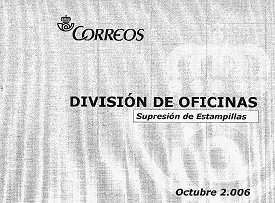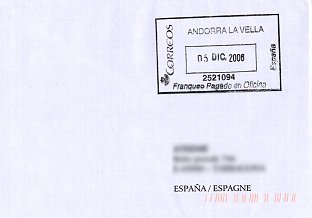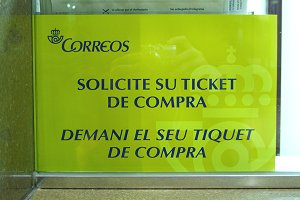With the forceful title of 'Supresión de estampillas' (ATMs removal), Spanish Posts - Correos sent in October 2006 a dossier to all the main post offices explaining the objectives and keys of the new admission and franking system. From the news and the begin of the pilot scheme in different Correos post offices in Spain at the end of 2005, there were many rumours and suppositions about the reasons of Correos to decide this important change, as well as its possible repercussions in philately collecting.
With this new system, they try to improve the process of admission of the shipments and to reduce the queues in the post offices; the postal employee or the customer will no longer 'lose the time' issuing and sticking stamps. For the post offices, with the removal of variable value stamps the process is also simplified, because it will be not necessary to change the rolls in franking balances, nor necessary to check the balance meters, also the operation costs will be reduced, because no more rolls of self-adhesive labels need to be manufactured and distributed among the post offices and, very important, in front of the current vulnerability of the ATMs, very easy forgery nowadays, they have decided for its removal. With the exception of the last argument, the 2 previous reasons could be easily debatable. Perhaps the new admission system can simplifies the process for the large mail users in the medium and large post offices, but in Spain already exists other franking systems for large or massive mail and the new system difficult very much the process in small post offices with no automatic cancellation machines. For the cost of the rolls and the distribution (the cost of maintenance will remains because the franking balances will continue in service with the new system), it was fully paid just with the orders of ATMs for collecting. Until now, when a customer arrived to the Spanish post office with a postal piece for franking, the postal employee weighed the shipment, issued and stuck the variable value stamp (in most of occasions it was no necessary to cancel it, because the stamp was printed with the date), issued the ticket and received the total amount.
From November 2006 we are witnessing in Spain the last phase of a process with a certainly doubtful end. Progressively, province after province, new post offices are added to the new mail admission system (the Salamanca post offices in November 14th, those ones in Lleida and Andorra the 28th, Coruña and Pontevedra on December 5th, Valencia on 15th ...). A remote modification in software, the Iris application, blocks the printing of ATMs in the Epelsa franking balances and all the post offices of the province connected to the postal application of Correos stop the issue of stamps in the established date. But, surprisingly, its not a total removal of ATMs, because in many of these post offices the LF vending machines continues in service. At same time, most of the small post offices with autonomous balances (not connected to the Iris application) continues issuing ATMs normally, and in some cases also the main post office of the province. Then, at this date the end of ATMs in Spain its still uncertain. The problems of control already known and explained in other articles are still more serious in the small post offices, many of them with autonomous franking balances, where a unique employee run all the post office works. With the new mail admission system, Who or how can be check this type of post offices? How it is possible to verify the payment of the right postal tariff for all the shipments ... and this amount goes all to Correos ? These serious control problems were already detected in the first pilots, but it seems that Correos does not care very much about it, because a year later the new admission system is being implemented without a definitive solution.
It is not either no secret that most of the post offices where the new mail admission system without stamps has been implemented the turnover is reduced very much, and in front of the complaints of the post offices managers the objectives are reduced. In short, an unprecedented process in a supposedly modern and competitive company that is being prepared for the great challenge of the total liberalization of the postal services in 2009. Something that can only happen in Correos ... Spain is different. (* Read articles: Pruebas para un nuevo sistema de admisión de envíos (sorry, only Spanish) - 1a. fase y 2a fase, and The new ‘Postage Paid’ impression at the Spanish Post Offices).
© J. Jove - M. Sans. ATEEME. Variable value stamps study group. All rights reserved This page was created in December 2006. Last updated: 08.01.07 . English edition rewritten by S. Goodman (xx.07) |


